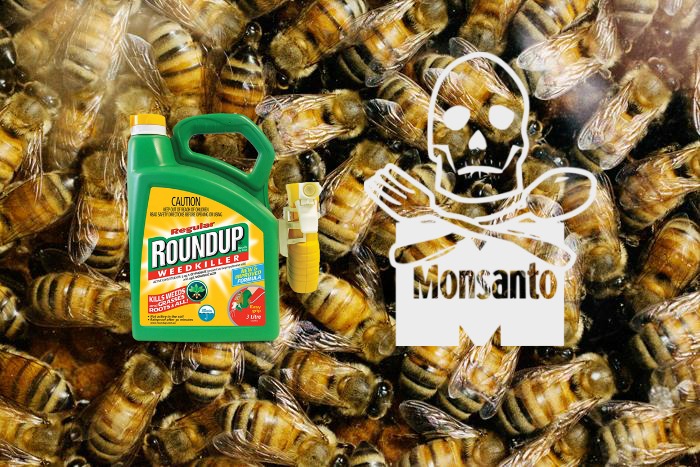 Brandon Turbeville
Brandon TurbevilleNatural Blaze
June 26, 2018
“I’m not going to be like everyone else, I’m going to file suit against Monsanto”
A beekeeping cooperative in northern France has filed a legal complaint against Bayer, the German chemical giant that recently merged with Monsanto after finding traces of glyphosate in their honey.
The herbicide was detected by Famille Michaud, one of France's largest honey marketers, in three batches of honey provided by its members.
The head of the cooperative in the region of Aisne, Jean-Marie Camus, said "They systematically analyse the honey shipments they receive, and they found glyphosate."
Glyphosate, also known as Roundup, is the most widely used in France, though French President Emmanuel Macron has agreed to attempt to ban it by 2021.
While evidence has repeatedly shown that links Glyphosate to cancer, liver disease, and a host of other negative health effects, it has also been linked to the decline in the bee population, making the discovery of glyphosate in honey all the more concerning since it is clearly reaching bees.
While evidence has repeatedly shown that links Glyphosate to cancer, liver disease, and a host of other negative health effects, it has also been linked to the decline in the bee population, making the discovery of glyphosate in honey all the more concerning since it is clearly reaching bees.
The new European Soviet, the EU, renewed the license for glyphosate weedkillers last November despite many Europeans and even European governments having deep reservations and intense opposition.
A lawyer for the cooperative, Emmanuel Ludot, says the contaminated honey came from a producer whose hives are located near sunflower fields, beets, and rapeseed.
But Ludot warned not to dismiss the idea that the contamination was also coming from gardeners who use Roundup on their properties.
The complaint came right as the merger between Monsanto and Bayer took place, which has created a agrochemical monster the likes of which has never been seen before, at least not since IG Farben, which Bayer was very much a part of, being engaging in the facilitation of Hitler's Nazi atrocities and the extermination of Jews in Germany's network of concentration camps.
Ludot hopes that the complaint will inspire and inquiry that will determine the amount of glyphosate in honey batches and the health consequences it may have for humans.
“It’s also a matter of knowing how widespread this might be. Famille Michaud tells me this isn’t an isolated case,” he said.
Ludot hopes that the complaint will inspire and inquiry that will determine the amount of glyphosate in honey batches and the health consequences it may have for humans.
“It’s also a matter of knowing how widespread this might be. Famille Michaud tells me this isn’t an isolated case,” he said.
The President of Familles Michaud, Vincent Michaud, told AFP that "we regularly detect foreign substances, including glyphosate."
If glyphosate is found, the organization rejects the entire shipment.
“Usually, beekeepers will say ‘In that case I’ll sell the honey at a roadside stand or a market’, where there’s no quality control,” Michaud said.
“But this beekeeper had the courage to say ‘I’m not going to be like everyone else, I’m going to file suit against Monsanto’,” he said.
Please fuel more news by sharing!
This article (French Beekeepers Go After Bayer After Glyphosate Found in Honey) was created by and appeared first at Natural Blaze. It can be reshared with attribution but MUST include link to homepage, bio, intact links and this message.
Get a nifty FREE eBook – Like at Facebook, Twitter and Instagram. Can republish but MUST include author name + link back at the TOP, links and bio intact. Must include this message!

Brandon Turbeville – article archive here – is an author out of Florence, South Carolina. He is the author of six books, Codex Alimentarius — The End of Health Freedom, 7 Real Conspiracies,Five Sense Solutions and Dispatches From a Dissident, volume 1 and volume 2, The Road to Damascus: The Anglo-American Assault on Syria,and The Difference it Makes: 36 Reasons Why Hillary Clinton Should Never Be President. Turbeville has published over 1,000 articles dealing on a wide variety of subjects including health, economics, government corruption, and civil liberties. Brandon Turbeville’s podcast Truth on The Tracks can be found every Monday night 9 pm EST at UCYTV. He is available for radio and TV interviews. Please contact activistpost (at) gmail.com.
No comments:
Post a Comment
Note: Only a member of this blog may post a comment.